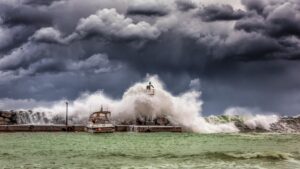 There are about 11 million registered recreational boats in the United States. With that number alone, it’s safe to say that Americans enjoy a lot of time on the water. And why wouldn’t they? There’s a lot of amazing things to feel and discover when you’re out there riding the waves. It’s an experience that you’ll never get from a simple drive down the countryside.
There are about 11 million registered recreational boats in the United States. With that number alone, it’s safe to say that Americans enjoy a lot of time on the water. And why wouldn’t they? There’s a lot of amazing things to feel and discover when you’re out there riding the waves. It’s an experience that you’ll never get from a simple drive down the countryside.
But like any other recreational activity, you have to consider boat safety precautions, because you’ll only be able to truly enjoy sailing if you’re not worrying about anything bad happening. As such, here are a few safety considerations you must make before heading out into the water.
DO Make A Pre-departure Checklist
This is the most critical thing you must do before getting your boat into the water. It’s where you inspect everything that you might need if trouble ever finds you on the water. We advise that you never, ever leave the land without doing this! Here are the things you’ll have to inspect as part of the pre-departure checklist.
- Life jackets: This is probably the single most important boat safety check ever. It doesn’t matter if you’re a strong swimmer yourself. Not everyone is! So before your next trip, make sure that there are enough life jackets for everyone on board.
- Throwable floatation devices: Think life preservers, ring buoys, horseshoe buoys, and even unconventional items such as boat seat cushions. This would apply to you if your vessel is over 16 feet long. If you can’t muster enough life jackets, throwable flotation devices can save lives out there. But make sure they’re accessible without much trouble! You don’t want to take your time trying to find one when somebody is overboard.
- Sound producing devices: People on the water often struggle screaming for help. More so if they’re not strong swimmers! So it won’t be enough to make sure they have life jackets. As much as possible, you should attach a whistle to each one. That way, you can find people on the water much easier. Also don’t forget to install a loud-enough horn that you can hear from at least half a mile offshore. Because if you need help on the water, it would be very helpful if people can hear you from land.
- Lights: Make sure that all your navigation and instrument lights are working! It’s way easier to get lost at night, when there’s little to no visibility. Again, you want people to see you and know where you are so they can help. You can also use a flashlight and make sure you have enough spare batteries in the event of a blackout on board.
- Distress signals: You can never have too many flares. Trust us on this. Low-light conditions can render your vessel pretty much invisible. A flare will enable potential rescuers to find your position a lot quicker. Also, never forget to check if your radar and radio communications are working.
- Fuel and oil: Carry enough extra fuel for at least two round trips. If you have space to store more, then do so! There’s nothing more troublesome than running out of gas in the middle of the ocean.
- Tools and spare supplies: Your main items must have backups. And your backups must have backups. Stash enough tools appropriate for your boat for whenever you need immediate repairs. As they always say, it’s better safe than sorry.
- Fire extinguishers: If your boat catches fire on the water, you’re stuck there. There are no firefighters on the water. So you better have enough fire extinguishers before embarking on a trip. You never know!
Related: Boat Inspection: Everything You Need to Know
 DO Keep Yourself Updated With The Weather
DO Keep Yourself Updated With The Weather
Remember those films when ships in the old days would get wrecked in storms? That’s a hard truth. No matter how advanced your boat might be, it won’t survive harsh weather unless it’s a large ship.
We can predict the weather, so use that technology to your advantage! Check for updates as much as you can, and do it at least a week before you go out into the water. Plot the weather patterns for an entire week and make good judgments on whether you should launch or not. If there’s even a slightest chance that the weather will get dangerous, reschedule your trip. Don’t take any chances. Even the slightest bump in weather patterns could be a sign of a storm.
Related: Safety First: Boat Handling Tips During Bad Weather
DON’T Be An Irresponsible Boat Owner/Skipper
A lot of boat safety boils down to being a responsible skipper. When you’re out on the water, don’t take risks that your skills and experience can’t handle. Ever. Keep within your boat’s operational limits, and you’ll be fine.
Use common sense as much as you can. Out on the water, a lot of things can happen in a split second. One minute the seas are calm, the next, it starts to get perilous. Use your gut instinct as well: if you feel something is off, go back to land. And to keep your mind sharp, don’t drink and drive a boat. That’s boat safety 101. Drinking and driving is plain irresponsible and dangerous. Driving a boat drunk is no different than driving a car while drunk.
 DO Have Durable Windows For Added Safety!
DO Have Durable Windows For Added Safety!
A boat’s got to have windows. And when you’re on the water, you want those boat windows to withstand anything nature throws at them. If they do, you’ll be safer from leaks. That said, let our pros at Peninsula Glass take care of your boat window needs! Talk to us today.
